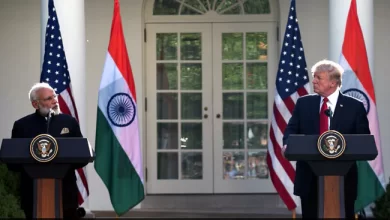
Pakistan harboured Taliban members, including terrorists from Haqqani network: Antony Blinken
When asked about how the US sees Pakistan's involvement in Afghanistan, Blinken said Pakistan has a "multiplicity of interests", including some that are in "clear conflict" with that of the United States.
The US is going to be looking at its ties with Pakistan in the coming weeks to formulate the role America wants Islamabad to play in the future of Afghanistan, Secretary of State Antony Blinken informed Congress. During his first testimony in Congress after the Taliban seized control of Kabul, Secretary of State Blinken noted that Pakistan has “harboured” members of the Taliban including the terrorists from the proscribed Haqqani network.
Asked by lawmakers if it is time for Washington to reassess its relationship with Pakistan, Blinken said: “We are going to be looking at in the days and weeks ahead, the role that Pakistan has played over the last 20 years, but also the role that we would want to see it playing in the coming years.”
Blinken made the remarks during his first testimony before Congress since the Taliban took control of Kabul.
The top US diplomat laid out the Biden administration’s posture toward the Taliban in remarks to the House Foreign Affairs Committee.
When asked about how the US sees Pakistan’s involvement in Afghanistan, Blinken said Pakistan has a “multiplicity of interests”, including some that are in “clear conflict” with that of the United States.
He added that India’s involvement in Afghanistan has influenced some “detrimental” actions by Pakistan.
Pakistan has been accused of providing overt and covert support to the Taliban. Early this month, former Afghan vice president Amrullah Saleh asserted that the Taliban are being micromanaged by Pakistan’s notorious intelligence agency–the ISI, adding that Islamabad is in charge of the war-ravaged country effectively as a colonial power.
During the testimony, US lawmaker Bill Keating reminded Pakistan Prime Minister Imran Khan’s remarks after the Taliban seized control that “Afghanistan had broken the shackles of slavery”. He said that Pakistan’s ISI had such strong ties in cooperation with the Haqqani Network, “responsible for so many things including the deaths of some of our soldiers, and even recently when the Taliban took over in the last month”.
“Prime Minister Khan claimed Afghanistan had broken the shackles of slavery. So we used to always hear diplomatically that we have a complicated relationship with Pakistan. I would say it’s often duplicitous,” he said.
Keating asked Blinken: “How do we reassess that relationship how we, how we learn from their actions? And when we go forward. What do we do, what are some of the big issues that we should have stakes in the ground that we should have in dealing with Pakistan and the way they’ve acted over these decades?”
To which, Blinken said Pakistan is involved in “hedging its bets constantly” about the future of Afghanistan.
“It’s one that’s involved harbouring members of the Taliban, including the Haqqanis. It’s one that’s also involved at different points, cooperation with us on counterterrorism, and so there are a number of things that have come into play it. It has a multiplicity of interests, some that are in conflict, clear conflict with ours,” he said.
“When it comes to Afghanistan, it’s focused, of course as well, on India and the role that India is playing in Afghanistan, and it looks at it through that prism as well. All of these things, I think, have influenced what it has done on many occasions detrimental to our interests. On other occasions in support of those interests,” he added.
Staunchly defending America’s withdrawal from Afghanistan, US top diplomat Antony Blinken on Monday said that staying in the war-torn country would have “re-upped the war for another five, ten or twenty years.” During his testimony in Congress, Secretary of State Blinken said: “The agreement reached by the previous administration required all US forces to be out of Afghanistan by May 1. Had the President not followed through on the commitments that his predecessor made, those attacks would have resumed.”
The top US diplomat laid out the Biden administration’s posture toward the Taliban in remarks to the House Foreign Affairs Committee.
Secretary of State Antony Blinken said even the most “pessimistic assessments” of the situation on the ground in Kabul, Afghanistan, did not predict that “government forces in the city would collapse while US forces remained,” during his congressional testimony.
“As General Milley, the chairman of the Joint Chiefs of Staff has said, ‘Nothing I or anyone else saw indicated a collapse of this army and this government in 11 days,'” Blinken noted.
Blinken continued: “Nonetheless, we planned and exercised a wide range of contingencies. Because of that planning, we were able to draw down our embassy and move our remaining personnel to the airport within 48 hours. And the military – placed on stand-by by President Biden – was able to secure the airport and start the evacuation within 72 hours.”
Secretary of State Antony Blinken said the Biden administration “inherited a deadline, we did not inherit a plan,” referring to former President Trump’s May 1 deadline for the US to withdraw from Afghanistan.
Blinken acknowledged that a lot of people “don’t know” the agreement the Trump administration made about Afghanistan before President Biden took office in January.
“I recognize that a lot of people don’t understand that, don’t know the agreement that was reached, and the choice that President Biden faced for May 1,” Blinken said.’
President Biden in remarks last month said he takes responsibility for the decision to withdraw at the end of August, but he also blamed his predecessor for signing on to an earlier agreement with the Taliban for a US withdrawal on May 1.
“My predecessor, the former President, signed an agreement with the Taliban to remove US troops May 1, just months after I was inaugurated. It included no requirement that the Taliban work out a cooperative government arrangement with the Afghan government,” Biden said.





